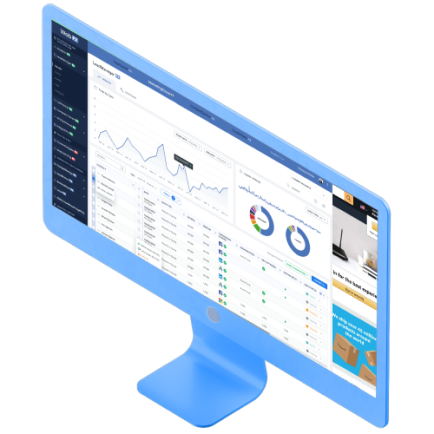-
 Published: Jul 18, 2023
Published: Jul 18, 2023
-
 7 min. read
7 min. read
-
 Sina Mchunu
Sina Mchunu Research & Tech Content Writer
Research & Tech Content Writer
- Sina is a marketing expert who specializes in SEO, AI, and digital marketing content. With over five years of experience, she’s written hundreds of pieces, spanning a variety of topics and industry niches. She loves combining her strong eye for detail and passion for storytelling in her work. You’ll find her fruit picking or horse riding at the local farm when she’s not writing.
Generative AI vs. predictive AI vs. machine learning — what’s the difference? Generative AI focuses on creating new content or generating new data based on patterns and rules obtained from current data. Predictive AI, on the other hand, seeks to generate predictions or projections based on previous data and trends. Machine learning concentrates on developing algorithms and models to gain insight from data and enhance performance.
Understanding the differences between various sorts of AI relating to your business is crucial for streamlining processes, improving customer experiences, and spurring innovation. Exploring the subtleties of generative AI, predictive AI, and machine learning will help you strategically implement the best solutions that fit your unique needs.
Let’s look at each AI type and its applications in different contexts. This article covers the following:
- What is generative AI?
- What is predictive AI?
- What is machine learning?
- Generative AI vs. predictive AI vs. machine learning
- Generative AI applications
- Predictive AI applications
- Machine learning application
Let’s begin!
We foster and form long-term partnerships so that your business has long-term results.
Over 90%
What is generative AI?
Generative AI is a subfield of AI that focuses on creating new material. It employs two neural networks — a generator and a discriminator — to generate realistic and unique outputs.
The generator network creates fresh data samples such as photos, messages, or even music, while the discriminator network assesses the assembled information and offers input to enhance its quality.
The generator and discriminator’s iterative process results in increasingly complex and realistic outputs.
What is predictive AI?
Predictive AI is a technology that uses statistical algorithms to predict upcoming events or outcomes. It entails analyzing historical data patterns and trends to spot probable future patterns and make precise forecasts.
Organizations use this technology to make data-driven choices and forecast future trends and customer behavior. It has earned substantial notice and recognition in a variety of industries, including:
- Finance
- Health care
- Marketing
- Manufacturing
- Retail
- Supply chain management
- Telecommunications
- Energy
These sectors can gather insightful information and enhance their decision-making processes by utilizing the power of machine learning and data analytics. This information aid in streamlining procedures, boosting productivity, and eventually increasing revenue.
What is machine learning?
Machine learning is a discipline of AI that focuses on creating models and algorithms that let computers learn and decide for themselves without being explicitly programmed. It involves training computers to:
- Analyze and interpret large amounts of data
- Identify patterns, and make predictions
- Take actions based on the patterns identified
Machine learning enables computers to continually learn from new data and enhance their performance over time by employing algorithms and statistical approaches. This technology powers everything from recommendation systems to self-driving cars, revolutionizing several sectors and transforming them into a crucial aspect of our everyday lives.
Generative AI vs. predictive AI vs. machine learning
The distinctions between generative AI, predictive AI, and machine learning lie in objectives, approaches, and applications. Generative AI is concerned with producing fresh and unique material, such as realistic visuals or music. It seeks to comprehend and emulate human creativity by learning from big data and creating innovative outputs.
On the other hand, predictive AI seeks to generate precise forecasts for future incidents or outcomes based on previous data. It makes judgments for organizations and predicts consumer behavior by using statistical models and algorithms to examine patterns and trends.
Machine learning, as a broader concept, encompasses both generative AI and predictive AI. It’s a field of research that focuses on creating algorithms and models that enable computers to learn, predict, or produce new material based on data. The ultimate objective of machine learning is to make it possible for computers to learn from experience and improve without explicit programming.
Measuring the metrics that affect your bottom line.
Are you interested in custom reporting that is specific to your unique business needs? Powered by RevenueCloudFX, WebFX creates custom reports based on the metrics that matter most to your company.
- Leads
- Transactions
- Calls
- Revenue

Generative AI applications
Generative AI has transformed several sectors by allowing machines to produce realistic and distinctive output. It’s pushing the bounds of artificial creativity by creating human-like visuals, composing music, and even designing fashion.
Here are some of the most fascinating Generative AI applications:
- Content creation: Generative AI can create unique and personalized content like articles, stories, and poetry. It can generate realistic images, videos, and music.
- Data augmentation: By producing synthetic data that closely mimics real-world data, generative AI can enlarge and diversify databases. It’s convenient for training machine learning models.
- Virtual customer service agents: Generative AI can operate virtual assistants or chatbots to give automated support to clients while managing repeated inquiries and tasks.
- Art and design: Generative AI can produce original, cutting-edge works of art and design that push the limits of creativity. It can create aesthetically amazing graphics, sculptures, and original architectural designs.
- Simulations and gaming: Generative AI approaches can produce fresh game material or make realistic simulations. It can improve the gaming experience by offering more realistic characters, surprising gameplay features, and fascinating locations.
Moreover, generative AI can improve simulation effectiveness by producing enormous data and situations, enabling more precise analysis and forecasting.
Predictive AI applications
Predictive AI offers valuable insights and forecasts in various areas, including health care, finance, marketing, and logistics, by studying patterns and trends. These technologies allow companies and organizations to make sound decisions, streamline operations, and improve overall performance.
Let’s explore some of the most innovative predictive AI applications and how they are affecting various industries:
- Demand forecasting in retail: Predictive AI can reliably anticipate future item demand by analyzing past sales data, industry trends, and other pertinent criteria. This technology aids merchants in streamlining inventory control, lowering stockouts, and enhancing customer satisfaction.
- Fraud detection in banking and finance: Predictive AI examines trends and abnormalities in financial transactions to identify probable fraudulent activity in the banking and finance industries. It can instantly identify suspicious activity and notify financial institutions, enabling them to take preventative action to stop fraud by continually monitoring and analyzing massive datasets.
- Predictive analytics in health care: Predictive AI identifies high-risk individuals likely to acquire specific diseases or ailments, allowing health care practitioners to intervene early and give focused preventative care. It can also aid in forecasting patient outcomes and the efficacy of treatments, resulting in more individualized and effective health care delivery.
- Predictive maintenance in manufacturing: Predictive AI uses data analysis and machine learning algorithms to forecast equipment breakdowns and plan maintenance tasks appropriately in the manufacturing industry. Manufacturers can reduce unexpected downtime, allocate resources more efficiently, and boost overall operational effectiveness by taking a proactive approach.
- Targeted marketing campaigns: Predictive AI algorithms evaluate consumer information and behavior to provide highly targeted and individualized advertisements. It allows companies to deliver customized communications to the appropriate audience at the right time, boosting the possibility of conversion and optimizing marketing return on investment (ROI).
These algorithms can also spot upselling and cross-selling opportunities, enabling firms to suggest related items or upgrades to clients. This method improves the client experience while increasing sales and income for the business.
Machine learning applications
Machine learning uses data and algorithms to create predictions, automate procedures, increase productivity, and improve decision-making skills. It has shown to be a game-changer in modernizing established systems and opening up fresh innovation opportunities.
Some typical machine learning applications include:
- Predictive analytics: Machine learning algorithms analyze data to produce forecasts and predictions, allowing organizations to make educated choices and spot emerging trends.
- Natural language processing: Machine learning technology analyzes and interprets human language, enabling chatbots, virtual assistants, and sentiment analysis.
- Image recognition: Machine learning models can be programmed to identify and categorize photos, opening the door to applications like object identification, facial recognition, and autonomous cars.
- Fraud detection: Machine learning-powered software can spot fraudulent activity in real-time by examining patterns and anomalies in data, assisting businesses in avoiding financial losses.
- Recommendation systems: Machine learning technologies examine user preferences and behavior to provide tailored suggestions, such as recommending books, movies, or items based on prior interactions.
Machine learning has transformed various sectors by enabling personalized experiences, streamlining processes, and fostering ground-breaking discoveries.
Meet RevenueCloudFX:
One platform tracking countless metrics and driving stellar results.
Learn More About Our Proprietary Software

Drive revenue with WebFX’s AI-powered marketing solutions
Our marketing automation software — RevenueCloudFX — allows you to optimize your marketing strategies and campaigns using artificial intelligence. This approach raises brand recognition, leads generation, and ultimately revenue growth.
Nutshell complements this by enabling your team to handle and nurture leads effectively, monitor sales results, and provide individualized customer experiences. These two practical tools offer a seamless and efficient way for your business to maximize marketing initiatives and foster growth.
Want to learn more?
Contact us online or call 888-601-5359 to speak with a strategist about how our AI-powered solutions can benefit your business.
-
 Sina is a marketing expert who specializes in SEO, AI, and digital marketing content. With over five years of experience, she’s written hundreds of pieces, spanning a variety of topics and industry niches. She loves combining her strong eye for detail and passion for storytelling in her work. You’ll find her fruit picking or horse riding at the local farm when she’s not writing.
Sina is a marketing expert who specializes in SEO, AI, and digital marketing content. With over five years of experience, she’s written hundreds of pieces, spanning a variety of topics and industry niches. She loves combining her strong eye for detail and passion for storytelling in her work. You’ll find her fruit picking or horse riding at the local farm when she’s not writing. -

WebFX is a full-service marketing agency with 1,100+ client reviews and a 4.9-star rating on Clutch! Find out how our expert team and revenue-accelerating tech can drive results for you! Learn more
Try our free Marketing Calculator
Craft a tailored online marketing strategy! Utilize our free Internet marketing calculator for a custom plan based on your location, reach, timeframe, and budget.
Plan Your Marketing Budget

Proven Marketing Strategies

Proven Marketing Strategies
Try our free Marketing Calculator
Craft a tailored online marketing strategy! Utilize our free Internet marketing calculator for a custom plan based on your location, reach, timeframe, and budget.
Plan Your Marketing Budget
What to read next





